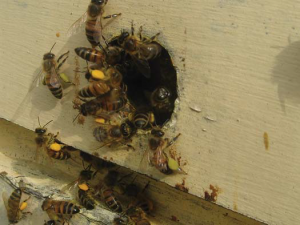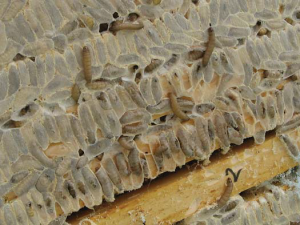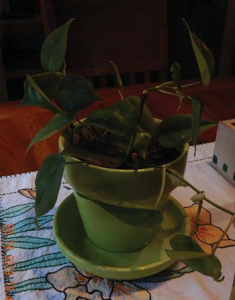By: Ross Conrad
Achieving success as a beekeeper can be elusive. It is a goal that is often based on factors that are changing all the time. It used to be that success in beekeeping was measured by the amount of honey harvested during the season. Today, I would expect that most beekeepers have additional criteria for evaluating whether or not a season has been a success.
Since success in this ancient craft tends to mean various things to different people, I can’t begin to explore what success means to you. What I can do is address a few of the things that I have come to use as a measure of my success in beekeeping.
Bees that survive
Thirty-to-fifty percent average yearly colony losses nation-wide for over a decade now means that keeping you bees alive is one of the top measures of beekeeping success in this day and age.
Keeping bees alive means having to pay attention to a wide variety of factors. Everyone tends to stress the importance of keeping the ubiquitous Varroa mite under control and while this is important, it can cause folks to ignore other potential threats to survival.
Colonies especially in wooded areas are very susceptible to bears unless steps are taken to protect them. Pesticide exposure that can be lethal both in the short-term and the long-term is a major challenge. Given that it is nearly impossible to locate apiaries entirely out of forage range of flowering plants that have not been exposed to pesticides, about the best a bee
keeper can do is not use toxic chemical pesticides in their hives and regularly rotate out the old combs before residues build up to problematic levels. Starvation is still all too common a cause of colony death even though it is one of the easiest things that a beekeeper can prevent with appropriate attention and care.
While the number of pathogens that can cause a colony to decline seems to grow longer every decade, many diseases have tested and approved treatments that work more often than not. Queen problems appear to be an ever increasing cause of colony loss these days and beekeepers that are able to create new queens themselves, or have a secure supplier lined up, have the edge when it comes to dealing with queenless hives. Wintering issues have historically been a challenge in northern regions where colonies must often contend with sub-zero temperatures in addition to a prolonged period of dearth. And across the nation, extreme weather events that too often turn deadly are becoming a greater concern prompting beekeepers to seek sheltered apiary locations on high ground that can resist heavy winds and high water.
For many years I had felt like a successful beekeeper. Average winter losses of 10-15 percent, while higher than I prefer, were nowhere near the 40-50 percent losses reported by others so I felt that I was doing reasonably well. Three years ago I doubled the number of colonies in my care. In each of the last three years since then I have lost 40-50 percent of my bees.
While other beekeepers seem to accept such losses and simply make up for them by creating lots of nucs and splits as replacements every year, this definition of success makes no sense to me. When what you do is not working well, continuing to do the same thing over and over and expecting a different outcome makes no sense. Clearly it is time for me to change my approach since what worked for me when I kept 50-60 colonies is no longer applicable at the 100 plus level, that is if I want to feel like I am successful in my beekeeping.
Successfully navigating the plethora of potentially lethal events that can afflict my colonies is one of the primary ways to succeed in my next measure of beekeeping success:
Preventing comb loss
An extension of keeping bees alive is maintaining enough strong colonies so that the bees are able to protect all the drawn combs in an operation from wax moths and small hive beetles. Reaching for a super of drawn comb to put on a hive only to find it destroyed by wax moths or full of fermented honey and small hive beetle larvae can be one of the most demoralizing things that can happen to a beekeeper, right after finding colonies that have died. When there are not enough bees to keep drawn combs protected, exposing combs to light and keeping them well ventilated will deter most moths, while alternatives like cold storage can work in a pinch for both moths and beetles. Preventing bear damage which can not only kill a colony but is typically accompanied by comb and equipment destruction at the same time, is a major concern in areas where bears range as well.
Similar to the need to protect drawn comb, is the need to protect honey once it is harvested and before it is extracted from the comb. Small Hive Beetle pressure has gotten so bad in recent years in the Champlain Valley of Vermont that this year I purchased a second extractor. This will allow me to keep ahead of the small hive beetles by extracting my honey faster and reduce the risk of losing frames of honey to the beetles. As one extractor is spinning out honey, I can be filling the second extractor with frames. Once I get the second machine filled, the first machine is finished and ready to be refilled as the second machine is running. I suspect that not having to wait around for honey to finish being extracted in one machine before I can refill it again and run another batch of frames is going to allow me to extract my crop about twice as fast as before.
Not having to feed

Success is when
a colony is able
to gather enough
nectar and pollen
that supplemental
feeding is
unnecessary to
keep the bees
from starving over
Winter.
The less I feed the more successful I feel – despite the fact that having enough food stored in the hive to tide a colony through winter ends up being primarily a weather driven phenomenon. Not having to feed typically means that my colonies were healthy and strong enough to take advantage of the available summer forage. Of course not every colony is always able to gather enough nectar to supply its entire yearly needs. However, if I can take excess honey from colonies that can spare it and use it to feed those in need, I am able to provide the best possible food for my bees without having to spend time and money purchasing sugar, mixing and feeding syrup and cleaning feeders when I am done. In my world, when less work is needed to get the job done, that can be counted as a success.
No honey to buy
As a beekeeper, few things are as fulfilling as supplying your household’s annual honey needs from the fruits of your own hives. There can be a sense of pride in not having to purchase store bought honey for one’s personal needs especially since store bought honey never tastes as good as honey you produce yourself. Of course, colonies that have survived the winter and yet remain strong enough to repel wax moths and small hive beetles, while producing enough honey so they don’t have to be fed for winter, will probably also produce excess honey that you can harvest and enjoy. Success builds upon success.
Excess bees that can be sold
One way of helping to prevent strong colonies from swarming in the spring is by splitting them and creating nucleus colonies in the process. Keep this up long enough and the successful beekeeper will have more colonies than is wanted creating an opportunity for an additional income stream from nuc sales. There are simply too many beekeepers out there that are not experiencing enough success, especially when it comes to keeping bees alive, and they are looking for replacement bees.
Making a profit
As those who keep bees as a sideline achieve success in the above areas of survival, comb protection, and not having to purchase feed or honey, there is a good chance profits will follow as a natural result.
Unfortunately, when profits are involved, there is always the danger of falling into the trap of being greedy. Taking too much honey from your colonies for example, is likely to adversely impact the survival of your bees.
The definition of beekeeping success is liable to change over time for each of us. What is critical to success, no matter how you measure it, is to not give up keeping bees. Sure it is a good idea to always look for ways to improve upon what you do and embrace the concept embodied within the Japanese word “kaizen” – small, incremental and continuous improvement. This may mean that you not only modify what you do, but try new things or adjust to new realities as you constantly invest in the health of your hives. One thing is for sure: you’re guaranteed to never succeed if you quit.










